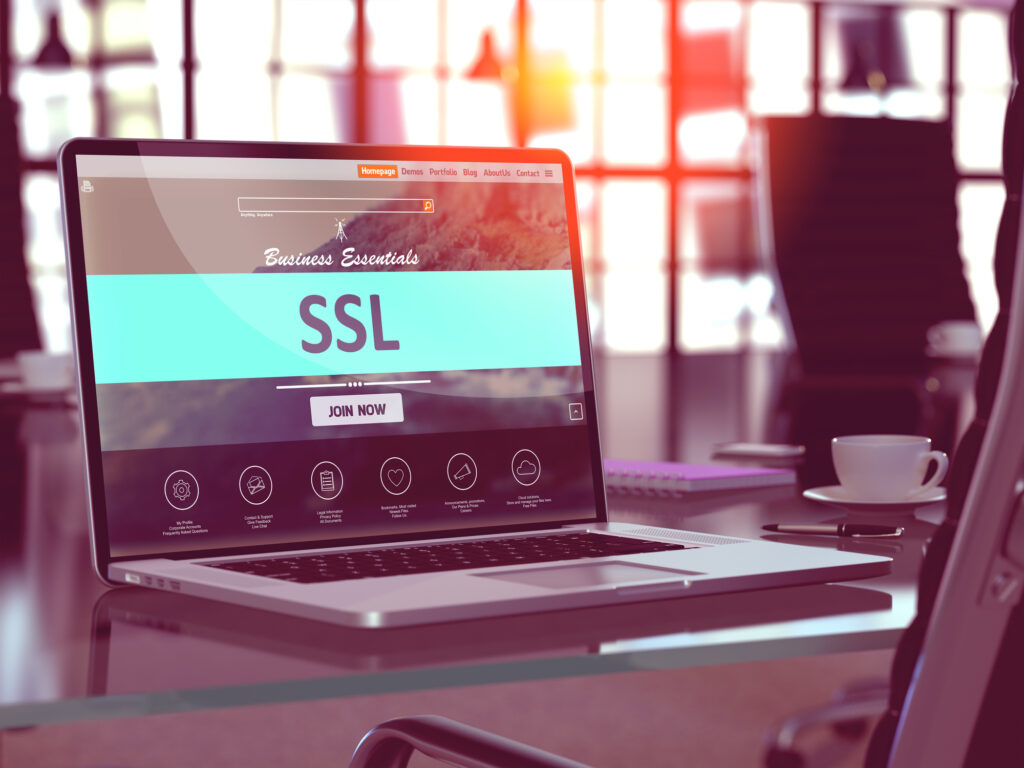
Welcome to our guide on SSL certificates! If you’re wondering what an SSL certificate is and why it matters, you’ve come to the right place.
What is an SSL Certificate?
An SSL (Secure Sockets Layer) certificate is a digital certificate that authenticates the identity of a website and encrypts information that is sent between the website and the visitor’s web browser.
In simpler terms, an SSL certificate secures the connection between a website and its visitors, ensuring that any information exchanged between them is private and secure.
There are now over 1.58 billion active websites in the world. Not every site is made equally, though. In fact, many websites lack the security necessary to protect their visitors.
$67.99
per year
Price excludes applicable taxes and ICANN fees.
Protect 1 site.
Domain validation
SHA-2 & 2048-bit encryption.
Boost SEO rankings
Fast issuance in 5min
Display HTTPS & padlock
Security trust seal
Support unlimited servers
Free unlimited reissues
$100,000 USD warranty
$99.99
per year
Price excludes applicable taxes and ICANN fees.
Protect 5 sites.
Domain validation
SHA-2 & 2048-bit encryption.
Boost SEO rankings
Fast issuance in 5min
Display HTTPS & padlock
Security trust seal
Support unlimited servers
Free unlimited reissues
$100,000 USD warranty
$349.99
per year
Price excludes applicable taxes and ICANN fees.
Protect unlimited sub-domains.
Domain validation
SHA-2 & 2048-bit encryption.
Boost SEO rankings
Fast issuance in 5min
Display HTTPS & padlock
Security trust seal
Support unlimited servers
Free unlimited reissues
$100,000 USD warranty
$149.99
per year
Price excludes applicable taxes and ICANN fees.
Protect 1 site.
Extended validation
SHA-2 & 2048-bit encryption.
Boost SEO rankings
Display HTTPS & padlock
Green address bar
Security trust seal
Support unlimited servers
Free unlimited reissues
$100,000 USD warranty
$349.99
per year
Price excludes applicable taxes and ICANN fees.
Protect 5 sites.
Extended validation
SHA-2 & 2048-bit encryption.
Boost SEO rankings
Display HTTPS & padlock
Green address bar
Security trust seal
Support unlimited servers
Free unlimited reissues
$100,000 USD warranty
There are several reasons why having an SSL certificate is important:
In summary, an SSL certificate is an essential tool for any website that handles sensitive information or wants to build trust with its visitors. It provides security, builds trust, and can even benefit your website’s SEO. If you haven’t already, it’s time to consider getting an SSL certificate for your website.
First, let’s answer the question that’s likely on your mind: what is an SSL certificate, exactly?
SSL stands for Security Socket Layer. SSL is a protocol designed to authenticate and encrypt data between an application and a web server. With an SSL certificate, you can create a more secure environment for your visitors.
“SSL” is often associated with the Transport Layer Security (TLS) certificate. In fact, TLS is the successor; a more updated version of the original SSL certificate. Some people might use SSL and TLS interchangeably.
The original version of SSL was created in the early 1990s by Netscape. It was never released to the public due to security flaws, though. Instead, the first released version, SSL 2.0, was released in February 1995.
Due to its own security flaws, SSL 2.0 was redesigned, prompting the release of SSL 3.0 a year later.
An SSL certificate can provide you with reliable encryption. It also improves your credibility through third-party validation.
In order to apply for an SSL/TLS certificate, you’ll need to own a company or domain. Then, you’ll send the application to a credible third-party, the Certifying Authority (CA). The CA will scrutinize your application before rejecting or approving it.
The application review process can take a few hours or days, depending on the certificate type. The certificate will then enable the Hypertext Transfer Protocol Secure (HTTPS). HTTPS is the superior version of HTTP.
If your website has the HTTPS protocol, you’ll see a green lock to the left of your website’s URL.
Today, most certifying authorities use TLS 2.0 for superior encryption.
How exactly does an SSL certificate keep your website secure?
First, you’ll need to install your certificate on the web server hosting your website. The SSL will then activate the HTTPS protocol.
An advanced cryptographic suite will contain complex algorithms to encrypt all server-client communications. The HTTPS protocol uses this suite to provide superior encryption on your website.
The encryption process will start when a browser sends a request to an SSL encrypted website. Each visit triggers the SSL handshake process. This process indicates the server and client agree upon a cipher suite, which generates session keys.
When the browser tries to connect with the web server, it will require the server to identify itself. The server will then respond with its public key and the SSL certificate.
Then, the browser is able to evaluate the root certificate for confirmation.
Session keys are symmetric, temporary keys that expire after each user session. If someone tries to intercept the encrypted data, it will appear illegible.
You can choose different SSL/TLS certificates based on whether you need validation or security coverage. There are also hybrid certificates available.
Validation-based certification includes:
Coverage-based classifications include:
You can consult an SSL certificate expert to determine what type of certification your website needs.
Why does having an SSL certificate matter? Here are a few reasons you should acquire a free SSL certificate for your website.
Consumers won’t choose a business that has a long history of getting hacked. In fact, your website users expect you to protect their data. Some people avoid using websites that don’t already have an SSL certificate.
Your certificate will protect the user’s email address, credit card information, and other personal data. You’ll give your website users peace of mind, knowing their information is safe.
Data privacy laws change all the same. The General Data Protection Regulation (GDPR) recommends that websites have HTTPS. Remember, the HTTPS protocol is activated after you install an SSL certificate.
Without the HTTPS protocol, you’ll struggle to remain compliant. You might have to pay a hefty fine as a result. Instead, you can remain compliant with the most recent data privacy laws to protect your business.
Remember, customers might not choose your business if you don’t prioritize their safety. Learning how to get an SSL certificate will show customers you care. You can improve their online user experience as a result.
By showing customers you care about their needs, you can also improve your online credibility. Otherwise, customers might second guess choosing your business. They might leave your website and choose a competitor’s instead.
What if people visit your website, see you don’t have an SSL/TLS certificate, and leave? Your clickthrough rate and dwell times will drop. Meanwhile, your bounce rate will increase.
A high bounce rate can have a negative impact on your search engine ranking. You could waste valuable time and money. If your ranking drops, consumers might struggle to find you online.
An SSL certificate will support your search engine optimization (SEO) strategy. You can rank higher, reach more customers, and boost your business!
Don’t leave your customers’ private information at risk. Instead, consider adding an SSL certificate to your website. With an SSL/TLS certificate, you can protect your users and give them peace of mind.
Your search engine ranking will also improve, allowing you to reach more customers.
Want to add a certificate to your website? We can help!
Contact us today to get started.


Robots.txt is a file that plays a critical role in search engine optimization (SEO). It tells web crawlers, also known as spiders or robots, which pages of a website they can and cannot access. By disallowing certain pages from being crawled, webmasters can prevent duplicate content from being indexed or keep sensitive information hidden from […]
READ MORE
Over 3 million websites around the world use cPanel hosting management software. It ranks as the eighth most popular content management system in the top one million sites. And its usage amongst hosting companies continues to grow with the US leading the way. This article explains what cPanel hosting is, what it does, and how it can help […]
READ MORE



